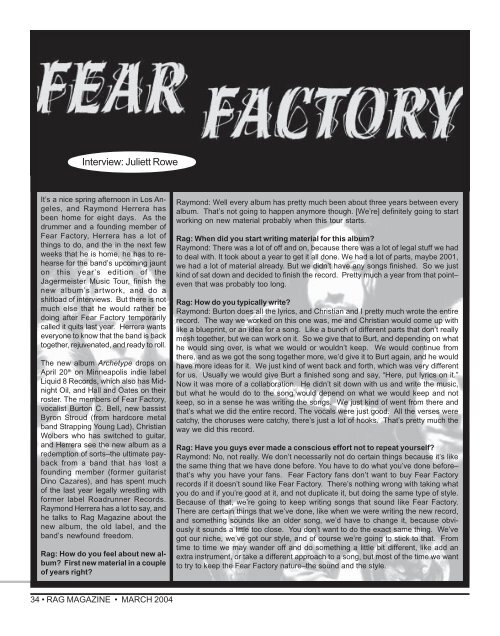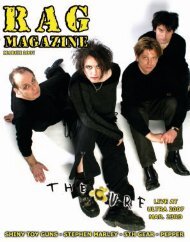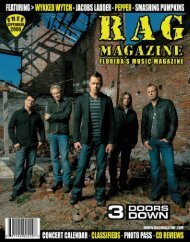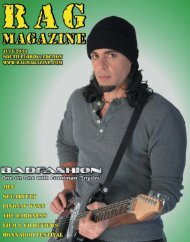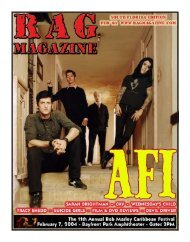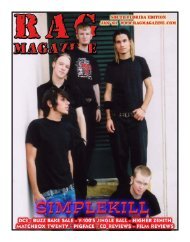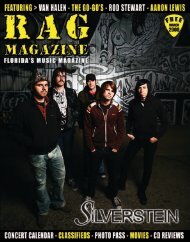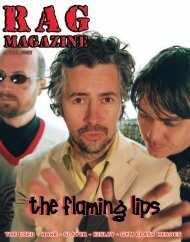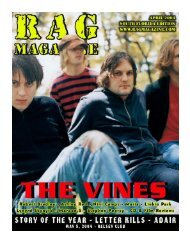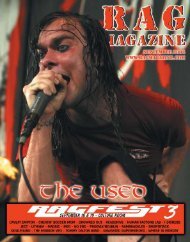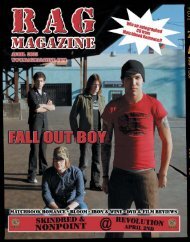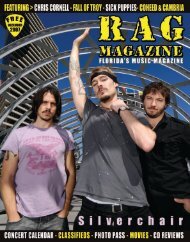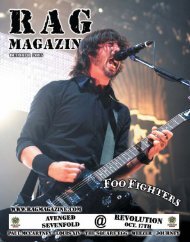Create successful ePaper yourself
Turn your PDF publications into a flip-book with our unique Google optimized e-Paper software.
Interview: Juliett Rowe<br />
It’s a nice spring afternoon in Los Angeles,<br />
and Raymond Herrera has<br />
been home for eight days. As the<br />
drummer and a founding member of<br />
Fear Factory, Herrera has a lot of<br />
things to do, and the in the next few<br />
weeks that he is home, he has to rehearse<br />
for the band’s upcoming jaunt<br />
on this year’s edition of the<br />
Jagermeister Music Tour, finish the<br />
new album’s artwork, and do a<br />
shitload of interviews. But there is not<br />
much else that he would rather be<br />
doing after Fear Factory temporarily<br />
called it quits last year. Herrera wants<br />
everyone to know that the band is back<br />
together, rejuvenated, and ready to roll.<br />
The new album Archetype drops on<br />
April 20 th on Minneapolis indie label<br />
Liquid 8 Records, which also has Midnight<br />
Oil, and Hall and Oates on their<br />
roster. The members of Fear Factory,<br />
vocalist Burton C. Bell, new bassist<br />
Byron Stroud (from hardcore metal<br />
band Strapping Young Lad), Christian<br />
Wolbers who has switched to guitar,<br />
and Herrera see the new album as a<br />
redemption of sorts–the ultimate payback<br />
from a band that has lost a<br />
founding member (former guitarist<br />
Dino Cazares), and has spent much<br />
of the last year legally wrestling with<br />
former label Roadrunner Records.<br />
Raymond Herrera has a lot to say, and<br />
he talks to Rag <strong>Magazine</strong> about the<br />
new album, the old label, and the<br />
band’s newfound freedom.<br />
Rag: How do you feel about new album?<br />
First new material in a couple<br />
of years right?<br />
Raymond: Well every album has pretty much been about three years between every<br />
album. That’s not going to happen anymore though. [We’re] definitely going to start<br />
working on new material probably when this tour starts.<br />
Rag: When did you start writing material for this album?<br />
Raymond: There was a lot of off and on, because there was a lot of legal stuff we had<br />
to deal with. It took about a year to get it all done. We had a lot of parts, maybe 2001,<br />
we had a lot of material already. But we didn’t have any songs finished. So we just<br />
kind of sat down and decided to finish the record. Pretty much a year from that point–<br />
even that was probably too long.<br />
Rag: How do you typically write?<br />
Raymond: Burton does all the lyrics, and Christian and I pretty much wrote the entire<br />
record. The way we worked on this one was, me and Christian would come up with<br />
like a blueprint, or an idea for a song. Like a bunch of different parts that don’t really<br />
mesh together, but we can work on it. So we give that to Burt, and depending on what<br />
he would sing over, is what we would or wouldn’t keep. We would continue from<br />
there, and as we got the song together more, we’d give it to Burt again, and he would<br />
have more ideas for it. We just kind of went back and forth, which was very different<br />
for us. Usually we would give Burt a finished song and say, “Here, put lyrics on it.”<br />
Now it was more of a collaboration. He didn’t sit down with us and write the music,<br />
but what he would do to the song would depend on what we would keep and not<br />
keep, so in a sense he was writing the songs. We just kind of went from there and<br />
that’s what we did the entire record. The vocals were just good. All the verses were<br />
catchy, the choruses were catchy, there’s just a lot of hooks. That’s pretty much the<br />
way we did this record.<br />
Rag: Have you guys ever made a conscious effort not to repeat yourself?<br />
Raymond: No, not really. We don’t necessarily not do certain things because it’s like<br />
the same thing that we have done before. You have to do what you’ve done before–<br />
that’s why you have your fans. Fear Factory fans don’t want to buy Fear Factory<br />
records if it doesn’t sound like Fear Factory. There’s nothing wrong with taking what<br />
you do and if you’re good at it, and not duplicate it, but doing the same type of style.<br />
Because of that, we’re going to keep writing songs that sound like Fear Factory.<br />
There are certain things that we’ve done, like when we were writing the new record,<br />
and something sounds like an older song, we’d have to change it, because obviously<br />
it sounds a little too close. You don’t want to do the exact same thing. We’ve<br />
got our niche, we’ve got our style, and of course we’re going to stick to that. From<br />
time to time we may wander off and do something a little bit different, like add an<br />
extra instrument, or take a different approach to a song, but most of the time we want<br />
to try to keep the Fear Factory nature–the sound and the style.<br />
34 • <strong>RAG</strong> MAGAZINE • <strong>MARCH</strong> <strong>2004</strong>


